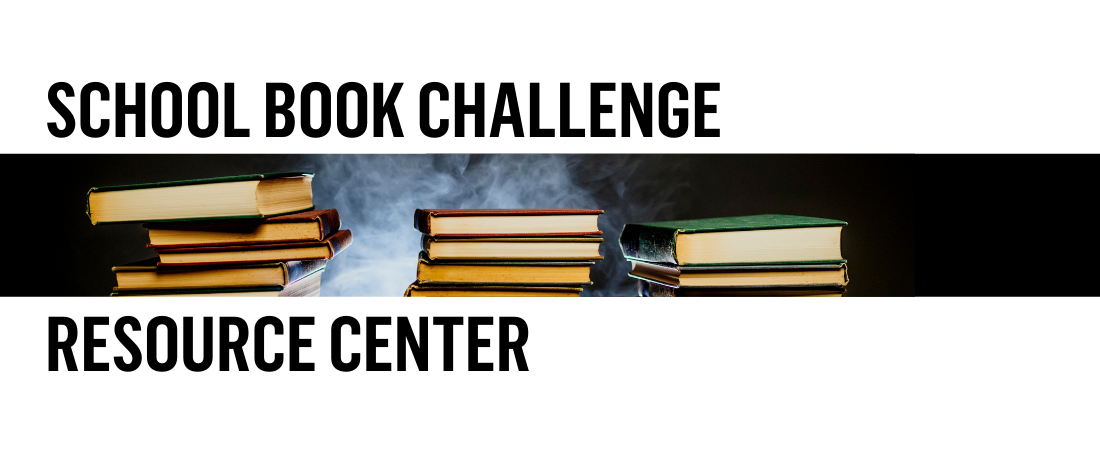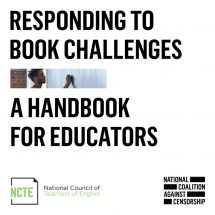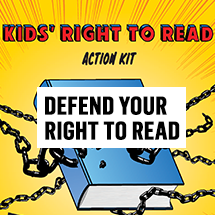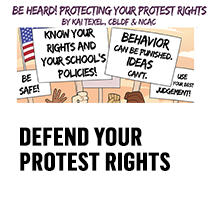What is school book censorship?
The books taught in schools, and available in school libraries, should be chosen by professionals based on criteria that are as objective as possible, including the books’ educational, pedagogical, literary and artistic values. When books are kept from students, whether they are removed from classroom teaching, taken off library shelves (or put into restricted circulation) or explicitly banned from schools, because of the personal or political beliefs of any person or group, rather than because of professional educational reasoning, that’s censorship.
Policies already exist in most districts to allow individual concerned parents to influence what their own children read. However, we have seen those policies ignored and repeatedly violated as books are removed without proper review based on the personal opinions of particular groups of people. We have also seen increasing reports of threats to the livelihoods and safety of librarians, teachers, school administrators and school board officials who do not accede to the demands of these would-be censors. No individual or group has the right to impose their beliefs on others. School officials, as government actors, have a First Amendment responsibility to ensure that no particular viewpoint or belief is allowed to dictate what students can learn and read.
This page contains resources to help you advocate for yourself, for your children, for your books, for your schools, in your own communities. Resources will be added and updated as they become available.
One of the best ways to fight censorship is to call it out as it happens. Not sure if it’s censorship? We can help with that, too!
*Note: your report will be kept confidential.
Guides
Explore NCAC’s full resource library
How to Advocate for Books
1. Do your research
Know the Policies
Your school district almost certainly has policies on how books are chosen (aka “materials selection”) and what should happen when books are challenged. They are likely published on your school board’s website, but you can also request them from your school. First order of business: Read the policy! Strong book review policies ensure that the process allows all perspectives to be heard, while respecting the rights of students. Book challenges are often highly contentious and emotional, and the regulations should ensure that all parties feel that they have been heard and respected, and also to ensure that decisions are made based on objective criteria which focus on the needs of students.
Read the Book
The whole book! Read the whole book! Often, censors try to claim that individual images, passages or scenes render an entire book unsuitable for students. Rarely have they read the whole book, a fact they often admit with pride. But images, paragraphs, even chapters, are not the whole story. That’s why strong book review policies require a review committee, made up teachers, librarians, administrators, parents, and students, to read the whole book and evaluate it based on established criteria. Books are quite often the safest, most accessible way for young people to engage with new ideas and situations, and can reflect realities of their lives they otherwise fear discussing. Books must be considered in their full context, not judged based on language read out of context or single pages printed on posters at school board meetings. You will be much better able to advocate for a book if you’ve read it.
Gather Expert Opinions
Compile reviews from places like School Library Journal, Kirkus Reviews and Booklist. The National Council of Teachers of English offers rationales for teaching particular books to members. Research what awards and commendations the book has received.
2. Find allies
Quietly: Reach out to people individually within your personal social, school and/or professional networks. Try to gauge their interest in becoming vocally involved in opposing book bans. Encourage them to read the books in question. Talk to them about why you feel so strongly about keeping these books in schools.
Publicly: Post in community spaces like online forums and email lists, as well as on your social media, expressing your concern and asking for others who agree with you to attend upcoming school board meetings or write letters. Plan to coordinate your messages and share ideas.
3. Don’t let those who oppose books be the only voices heard
A few key advocacy tools:
- Attend school board meetings and sign up to speak.
- Write letters to school administrators, board members and local officials. Putting your opinions on the record shows district officials that those trying to remove books are not the only ones with strong opinions on these issues and can help support officials to make decisions that protect free expression. Sample letters for students and teachers are below and can be adapted for any writer.
- Contact local media and write letters to the editor of local publications. Letters to the editor are most likely to be published if they are short (think under 200 words) and personal (explaining the impact on you or your community).
- Start or join social media campaigns like #BooksNotBans and #FReadom, as well as local initiatives.
For parents: Talk to your kids about free expression, differing opinions and why it’s important to fight for the rights of all students to access books–even if they aren’t personally interested in reading them.
Remember: Not all books will appeal to all students. That’s okay! If every library book was required to serve every student, the shelves would be bare. A library, including a school library, is meant to include a broad selection of books that provide value to students. Parents who object to their own students reading particular books can utilize district procedures the allow them to influence what their own child reads without imposing their beliefs on all students.
4. Amplify student voices
Too often in this debate, we don’t hear from the people most directly affected: students. Which makes it incredibly powerful when we DO hear students speak about why challenged books matter to them, why their free expression rights must be protected and how these controversies impact their lives at school and outside it. Here are a few examples of student advocacy that have inspired us:
North East Independent School District, Texas
December 13, 2021
(Students speak around 39:30)
North Kansas City, Missouri
November 22, 2021
(Students speak around 28:00)
Read local news reports
Downers Grove, Illinois
November 15, 2021
(Students begin speaking around 1:12:00)
Read about the students’ speeches
Valuable Resources
- CPD Action offers a useful guide for building community power via school board elections. Book banners have done a great job of working their way onto school boards across the country and this guide helps fight back.
- The Utah Library Association recently published this guide full of excellent information about fighting book challenges.
- The American Library Association has tools for librarians on how to respond to challenges, hold public meetings and work with media.
- A toolkit for parents organizing community advocacy: This guide from Learn From History includes sample social media posts and letters to the editor of local publications that can be adapted for your specific situation and community.
- Speaking publicly, particularly on such a politicized topic, can bring backlash. This manual from PEN America addresses how to deal with online harassment.
- For a deeper dive into how the First Amendment applies to and functions in public schools, see NCAC’s First Amendment in Schools resource here.
Legal Advice and Employment Protection
NCAC does not litigate. But if you feel that a situation requires legal intervention, there are organizations that can assist you. If you are a teacher or librarian concerned that your job is under threat, reach out to your local union as a first step.
Sample Letter from Students
[Feel free to cut, paste and adapt!]
Dear [Principal/School Administrator/Board Chair/Librarian],
I am a student at [School Name] and I am writing about recent attempts to restrict kids’ access to [Book Title] by [Author Name]. I understand that the book has been challenged because __________________.
All people, including and especially young people, have a right to read. When we ban books we dislike or disagree with, it deprives others of their freedom to read and form their own opinions.
I have read [Book Title] and formed my own opinion about the book. I believe it is a valuable book because _______________. The book is also widely celebrated and available in many public libraries across the country. [Book Title] was awarded the [Book Award Name(s)/Year.] [Mention some positive reviews the book has received.].
If parents do not want their children to read a particular book, then they are free to request a different one. But they may not deny others access to the book or tell other parents what their children may read.
[School/Library Name] has a responsibility to prepare its students to succeed in our diverse and complex world. Helping students understand and tolerate different views is a key part of that. By removing the book, [School/Library Name] is abandoning this responsibility. Removing the book also sends a message to students like me that the views of a few members of our community are more important than the quality of our education.
Please, show that you value our right to read and think freely by keeping [Book Title] in our [school/library]. Thank you.
Sincerely,
[Your Name]
Sample Letter from Parents
[Feel free to cut, paste and adapt!]
Dear [Principal/School Administrator/Board Chair/Librarian],
I am writing to express concern about efforts to remove [Book Title] from the [curriculum/shelves] at [School/Library Name]. I understand that the book has been challenged because of objections to __________________.
As a parent and advocate of the right of children to read, I believe removing [Book Title] solely based on these objections would be a terrible disservice to your students. I have read [Book Title] and I think it is a valuable book for students to read because _________________.
I strongly urge you to keep this book in the [curriculum/shelves] at [School/ Library Name] and to uphold the freedom to read for all students in our community. The Supreme Court has ruled that the right of all children to read books free of viewpoint discrimination is guaranteed by the First Amendment. Not everyone in our community shares the views of those opposed to [Book Title] and the challengers have no right to impose their views on others or demand that the educational program reflect their personal preferences.
If parents do not want their children to read a particular book, then they are free to request an alternative assignment. But they may not infringe upon the rights of others to read the book or tell other parents what their children may read.
Furthermore, restricting access to the book will only chill free expression in our community. It will discourage [teachers/librarians] from introducing new ideas and expanding children’s minds. It will dissuade children from asking questions, for fear of addressing “offensive” or “inappropriate” topics. It will teach them that fear and ignorance supersede the quest for knowledge.
Reading is the safest way for kids to learn about the world in which they are growing up, and doing so in a classroom setting, with guided discussion, will only help them anticipate and appreciate real-life problems.
I therefore urge you to ensure that [District Name] policies are followed and that [Book Title] remains available to students at [School /Library Name].
Sincerely,
[Your Name]






